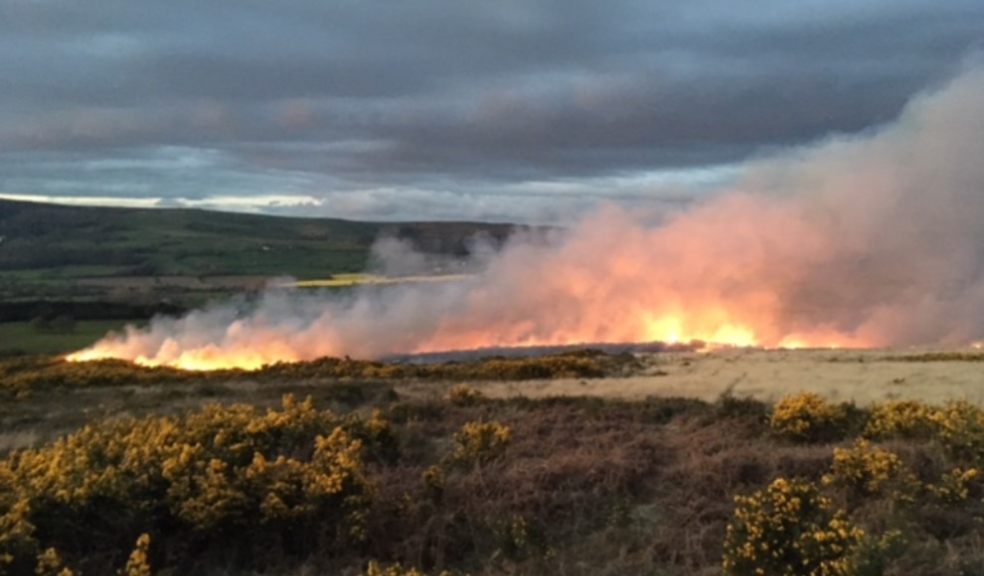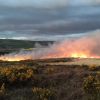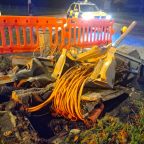
Pack a picnic to protect Devon’s countryside this summer
The RSPB is joining Devon and Somerset Fire and Rescue Service (DSFRS) to ask people to help them protect Devon’s RSPB nature reserves and wider countryside from wildfires this summer.
The appeal is being made to help prevent fires, keep people safe and protect the region’s valuable heathland habitats, and the wildlife that live there, ahead of the summer months.
2023 was confirmed as the world’s hottest year on record according to the Met Office and 2024 could be another year of high temperatures, risking heatwaves and fires across the country.
Now the charity is reminding visitors that barbecues and campfires are not permitted on RSPB England nature reserves, but picnics are very welcome to be bought from home. Smokers are being asked to take extra care when smoking and to extinguish cigarettes in a safe manner.
Visitors are also reminded to take home any litter when enjoying Devon's greenspaces, as fires can be sparked from unlikely items during the warm, dry weather. Food discarded outdoors can also cause issues for resident wildlife, the RSPB asks people to please dispose of it at home.
RSPB Aylesbeare nature reserve in Devon is a stretch of picturesque heathland located in the East Devon National Landscape, which teams with special and protected wildlife.
The UK has lost over 85% of lowland heath over the last 200 years, due mainly to forestry, roads, farming, building and mineral extraction. But this valuable habitat and the wildlife that lives here, is at high risk of fires throughout the year, due to its dryness. This is heightened during the summer months when more people choose to cook and eat outdoors.
RSPB Aylesbeare, part of the Pebbledbed Heaths National Nature Reserve (NNR), and the surrounding Devon countryside, provides a home for a unique mix of special wildlife, which rely on heathland to survive and thrive. These include Dartford Warbler, Stonechat, Nightjar, Adder, Grass Snake, Smooth Snake, Common Lizard and Slow Worm – all of which nest on or near to the ground making them especially vulnerable to fire. The reserve is also home to Southern Damselfly and the rare Silver-Studded Blue, Small Heath and Pearl Bordered Fritillary butterflies. As well as special bog plants, wild orchids and the reserves grazing Dartmoor & Exmoor Ponies and Cattle, which help manage RSPB Aylesbeare for wildlife.
Taking care not to start wildfires has never been so important. Climate change means that in the UK, and around the world, extreme weather events such as heatwaves are becoming more frequent, long-lasting, and intense. This extreme weather is increasing the scale, intensity and frequency of wildfires all over the world.
Toby Taylor, Site Manager at RSPB Aylesbeare, said: “We are really grateful for the care and caution that most of our visitors take when exploring our Devon nature reserves and wider countryside. However, fires can be started by items that people wouldn’t even consider a risk. The use of disposable barbeques are not allowed at RSPB sites as they are an obvious fire risk for green spaces, but even a glass drinks bottle left In dry heather, grasses or leaves can start a fire on a sunny day. And a cigarette-end flicked out of a car window can quickly turn into a blaze.
“All it takes is a gust of wind to carry the spark a short distance to the dry and highly flammable heathland vegetation. And depending on the remoteness of the location, it can be really challenging for our local fire service to reach the area easily.”
In April 2017 wildfire caused damage to 40-hectares of the protected and precious East Devon Pebblebed Heaths. It took 160 firefighters eight hours to put it out. It can take a decade for heathland to fully recover after a fire.
Toby continues: “Heathland is one of the few habitats that is extremely flammable in the dry summer months, vast areas of highly designated heathland habitat are vulnerable to accidental wildfires, we work really hard to keep the habitat in good condition and suitable for all of our native wildlife, a single slip of concentration or accidental source of ignition can lead to massive destruction of this very rare and precious habitat.
Although fire is used as a management tool we need to be extremely careful in these dry summer conditions.”
Kate Saint, Head of Prevention at Devon and Somerset Fire and Rescue Service, said: "As we eagerly await the sunshine, it's crucial to prepare and be aware of the outdoor fire risks in hot weather. Warmer months bring a big increase in wildfires, which spread fast and are hard to predict - risking firefighters' lives and harming plants and wildlife.
"Taking small actions like properly disposing of rubbish and extinguishing cigarettes can make a significant difference in preventing wildfires – something as simple as a discarded glass bottle could spark a flame from the sun’s rays. And, simply choosing to take a picnic instead of a disposable barbecue, or pre-cooking barbecue food to take out with you, can contribute towards a safe summer for everyone.”
Wildfires have also been accidentally caused by people who believe they have responsibly extinguished BBQ and campfire flames after use. However, some fires can travel below the ground’s surface.
Kate explained: “Seemingly extinguished bonfires and barbeques can often pose a continued wildfire risk. Residual heat and embers can cause hidden smouldering fires underground, sometimes for several days, before spreading to surface vegetation. These unseen fires can be particularly challenging for firefighters to detect and can spread quickly, unnoticed. It’s another reason that we encourage people to take picnics out with them and not a barbecue.”
Devon and Somerset Fire and Rescue Service recommends these steps to help prevent wildfires:
- Avoid having open fires or using barbecues in the outdoors when the weather is hot and ground conditions are dry.
- Barbecues and campfires are often banned in country parks, at campsites, and on open spaces. Make sure you check what is and isn’t allowed where you are and follow the rules.
- Extinguish fires and cigarettes properly and take your litter home.
- If you see a fire in the countryside, report it immediately to Devon and Somerset Fire and Rescue Service. Early detection can prevent it from developing into a large wildfire incident.
- Ensure you know where you are located at all times – sometimes it’s tricky in woodland or on moors. Rescue location apps like What3Words can help with this.
Toby added: “We want visitors to thoroughly enjoy RSPB Aylesbeare this summer and eating outdoors is part of the fun. Visitors are welcome to bring their own pre-prepared food from home and they will find a number of comfy benches on the reserve, offering stunning views, perfect for enjoying a picnic.
“We also want to thank Devon and Somerset Fire and Rescue Service - without their tireless work and swift action we wouldn’t have our special Devon countryside to enjoy safely.”
For more info about how to prevent Wildfire Outbreaks: bit.ly/RSPBWildfires
For more info about RSPB Aylesbeare: rspb.org.uk/Aylesbeare
For more info about DSFRS: dsfire.gov.uk/



















